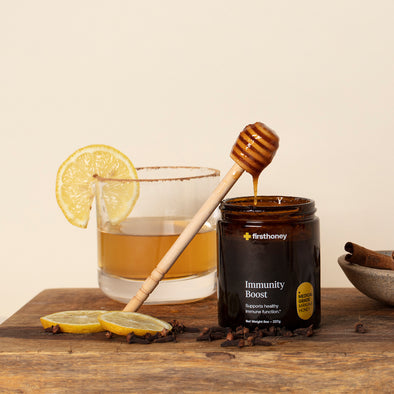Can You Eat Mānuka Honey When Pregnant?

You may have heard that children under one year shouldn't eat honey?
That's true. Honey contains bacteria that can introduce toxins in a baby's intestines, leading to a serious condition known as infant botulism. For this reason, experts recommend not to give honey to babies until they reach the age of 1.
Which begs the question: Can you eat Mānuka honey when pregnant?
Luckily, this sweet and sticky treat is safe for you and your unborn child. Keep reading to learn more about Mānuka honey pregnancy, including the precautions to take and why Mānuka honey is good for pregnant women.
Is It Safe to Eat Honey During Pregnancy?
The simple answer is yes.
Eating Mānuka honey during pregnancy won't harm you or your unborn child. That's because an adult stomach can handle the bacteria that cause infant botulism.
Even if the bacteria somehow manage to get past a mother's stomach, research shows that it's very unlikely to cross the placenta to reach the baby. And even in rare cases where women became sick with botulism, the sickness wasn't detected in the unborn child.
In the UK, the National Health Service (NHS) advises that eating honey during pregnancy is safe. While the FDA doesn't explicitly state if you can eat Mānuka honey when pregnant, it doesn't include it on the nationally recommended list of foods pregnant women should avoid either.
That said, if you have gastrointestinal problems such as inflammatory bowel disease or Crohn's disease, it's advisable to avoid honey for your health. Pregnant women with these conditions are more susceptible to infection from botulism-causing bacteria.
Is Mānuka Honey Safe During Pregnancy?
Yes! You can eat Mānuka honey when you're pregnant.
Better still, Mānuka honey has therapeutic properties that can help suppress your skin's elasticity. It can also help reduce inflammation, keep your skin hydrated, and reduce the likelihood of developing stretch marks.
Why Choose First Honey Mānuka Honey?
Taking First Honey Mānuka honey while pregnant is probably one of the best decisions you'll ever make. Here's why.
- It's 100% natural
- It's rich in Zinc, Iron, Potassium, Phosphorus, vitamin B, and many other nutrients beneficial during pregnancy
- It has powerful health-improving properties beyond the typical attributes of honey due to a chemical compound it contains called methylglyoxal (MGO), nonexistent to any other diversity of honey
- It improves digestive symptoms
- Has no side effects
Mānuka honey is safe to take as long as you're not allergic to it. You can even use it while breastfeeding.
How Does Mānuka Honey Benefit Pregnant Women?
In general, honey has numerous health benefits owing to its therapeutic properties.
This tasty product has been used by many ancient cultures to treat various conditions. But how does it benefit pregnant women?
Mānuka honey contains properties that can improve your overall health. It makes your immune system stronger so your body can fight disease-causing microorganisms. Mānuka honey can help you fight against stomach ulcers and improve your digestion naturally.
- A great Source of Energy
While pregnant women don't need extra calories for strenuous exercises, they need enough energy to support the healthy growth of the baby. Mānuka honey is an excellent source of energy, and if used regularly, it will hydrate you as well.
- Helps Ease a Sore Throat and Cough
As mentioned earlier, honey has anti-inflammatory properties. If taken with ginger or lemon tea, it produces a soothing effect on the throat. This is traditionally known to help one recover from a sore throat and provide cough relief.
- Natural Remedy for Heartburn and Ulcers
Pregnant women are vulnerable to heartburn. Some will tell you it's the most uncomfortable condition during pregnancy. Many pregnant women have found relief from heartburn after taking Mānuka honey.
Besides heartburn, First Honey Mānuka honey has proven to be a safe remedy for ulcers. Research shows that regular consumption of honey could decrease the growth of Helicobacter pylori bacteria, responsible for causing duodenal ulcers.
- Soothe the Itching
As time passes, your belly grows. It starts stretching, and this can cause redness, itching, and irritation. First Honey Mānuka Honey Cream can help to soothe out the itching area.
Researchers have observed a variety of characteristics of honey that could make it effective for treating skin conditions.
When Not to Take Mānuka Honey
If you have gastrointestinal problems, it's advisable to avoid all types of honey during pregnancy. As mentioned earlier, adults with any gastrointestinal condition, such as Crohn's disease, are more susceptible to infection from bacteria in honey that causes botulism.
Also, since honey naturally contains sugar, people with type 1, type 2, or gestational diabetes should check in with their doctor before using honey during pregnancy. They should stick within the recommended sugar levels.
Lastly, those allergic to bees or pollen grains should not take honey. If you have little tolerance for honey and its products, Mānuka honey isn't for you.
Wrapping Up
From the points above, we can confidently say that you can eat Mānuka honey when pregnant. It has many therapeutic properties that are beneficial for the mother and the baby. So, discard the old myths and grab yourself a jar of First Honey Mānuka honey today.


